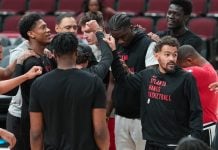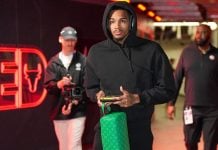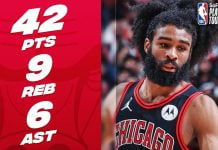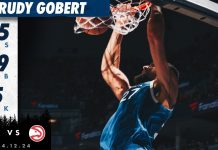Warning: Undefined array key "file" in /home/talkbask/domains/talkbasket.net/public_html/wp-includes/media.php on line 1734
Malcolm Delaney was one of European basketball’s most familiar figures to have come back to the Euroleague last autumn. The 30-year-old guard took his time before FC Barcelona eventually lured him into a one-year deal with an option for another season. By the time Delaney signed, almost all teams had completed their rosters, but for the Spanish powerhouse the former All-Euroleague combo guard was just the impressive icing on the cake. After all, who wouldn’t want to join a squad featuring some of the most charismatic players in Europe?
After a good, but inevitably unsung last season in China, the man who starred in the ultimate Cinderella Story with Lokomotiv Kuban in 2016, leading the Russian side to its first-ever Final Four at the expense of his present club, is coveting every silverware available in the Old Continent. Despite going undrafted in 2011, Delaney fulfilled his NBA dream with the Atlanta Hawks, for whom he played in two rather uneventful campaigns (2016-18), averaging 5.7 points, 2.8 assists, 17.8 minutes of playing time in a total of 127 games.
In his second collaboration with coach Svetislav Pesic, the Baltimore-born baller will not settle for anything less than trophies. If winning is a habit, Delaney – in this interview with TalkBasket.net- candidly addresses the factors that rendered his brief NBA stint way less illustrious than expected and the reasons behind more and more NBAers choosing to play in Europe.
Q: What did it take for FC Barcelona to win the game against Panathinaikos OPAP in Athens?
A: I think we just stuck with it. In the first half, we got a lot of open looks, but we didn’t make shots. We came in at halftime knowing that there would be some open shots and all we had to do was make some. We made good stops at the end and got momentum of the game. Overall, we played really well in the fourth quarter.
Q: How do you feel playing in Europe again?
A: I always felt comfortable playing in Europe. We have a great team in Barcelona and it was easy for me to fit in. Some days, I don’t have to do much, but in this second half of the season I’m trying my best to stay in good form and play my best basketball. We’ve all been playing well, especially in Euroleague, but we need to just keep getting better.
Q: How and what did China add to your experience as a player?
A: It’s a different style of basketball. You can’t compare NBA, Europe and China. It’s all different.
Q: What has changed in the Euroleague since 2016, when you moved to the NBA?
A: Just the different style of the competition and the format. Besides that, the basketball is still the same. I think that the teams and a lot of players got better, but European basketball as a whole is always going to be very skilled and team-oriented.
Q: Is the season in Europe overlong?
A: Yeah, I think it is too long. Maybe it’s something to look at in the future. It would be perfect if it was a little bit shorter, but everybody playing in their domestic league makes it kind of tough. I believe that eventually the Euroleague will become this big league, in which the top team in every country will compete. That style of NBA format where you play every team two-three times in the season makes it a lot more competitive. It could be shortened up a little bit, but it’s still pretty good the way it is.
Q: So, would you agree with clubs leaving their national leagues for whatever reason, like Olympiacos Piraeus did in Greece?
A: I guess their situation was a little bit different. It was a very political decision and I don’t do politics in basketball. I don’t really know exactly what happened, but it would be good for the best European teams to compete in one league.
Q: Coach Pesic has repeteadly stated that European basketball is the “real thing”. Would you agree with that?
A: I’d say it’s more skilled than anywhere else. I wouldn’t say it’s the only true expression of basketball because some NBA teams play the European style of the game with high-level players. The game in Europe is for sure more enjoyable to watch. You look at how team game is played and I can see why coach Pesic said that.

Q: After your first NBA stint with the Atlanta Hawks, what’s the first thing you’re going to look at before signing with a franchise in the future?
A: Just being the right fit. I’m older now, I value different things now, most importantly my family. Looking forward to retirement I have to start looking at my future as well. When I was younger, it was just about basketball, but now there’s a couple of other things I have to look into, as far as my future, before I make another decision; but wherever I go next or if I stay here, I want it to be my home because I don’t want to do anything on a temporary basis. So, whatever I do, I want it to feel like home so that I can finish my career there.
Q: Would you ever contemplate returning to the NBA?
A: Yes, of course. The NBA is the best league in the world and you can never turn down a chance to play in front of your friends and family. That’s always an option for me. I’ll see how the season goes and I’ll make the best decision for myself.
Q: What did not work out with you and the Hawks?
A: I think the second year we had two different mindsets. In my first year, we were trying to win and in my second year, they were trying to tank. I just got caught up in a situation with the team. I was in good form, played well in my second year, but it was just out of my hand. The people who brought me in there were leaving. I knew it was just political. Then I had the ankle injury in the end of the season and that’s the reason I went to China.
Q: What’s your overall view of your NBA time?
A: Well, I enjoyed the experience, although on record I said that my second year I didn’t really have fun. That’s because we weren’t winning and for me it’s all about winning. When I’m in a situation where people are not trying to win, that discourages me.
Q: Did you explore any NBA opportunities last summer before joining FC Barcelona?
A: Yeah, I weighed a couple of options and I went to mini-camps with the Knicks and the Warriors, but they wanted to wait and I didn’t really want to do that. I wanted to play basketball. The plan for me and my agent was to wait for the NBA, but when Barcelona came and I saw the team that they were building, I didn’t just want to keep sitting around. With this roster, it was hard to turn them down. So, I wanted to come here, get into a good rhythm and see where it goes from there.
Q: Did you talk to anyone on the Barcelona team before signing?
A: Victor Claver. Me and him played together in Lokomotiv Kuban. I kept in contact with him over the last couple of years anyway, but I called him and asked about everything here. I had played against Niko (Mirotic) in the NBA. Besides, I was pretty familiar with Barcelona because they had offered me a long-time contract before I went to Atlanta.
Q: Do you think that Europe has turned into an attractive destination for NBA players?
A: I think so. NBA is changing. There’s a few teams trying to win, the other teams are just trying to play their young guys. Some of those spice that players normally had, they don’t have now because teams don’t want to win. So, if they see how the level of competition is in Europe and that they can make good money, playing at a high level, I believe that a lot more people are open to come in here.
Q: Have you ever considered the possibility of getting a foreign passport?
A: No. I had a lot of opportunities when I was younger, but I realised that it doesn’t benefit me. It wouldn’t help me out for anything. I don’t want to play for another country. The summer time is important to me so I can be with my family and rest my body.
Q: Do you agree with Rick Pitino’s tweet on Mike James being a potentially good fit for the Knicks?
A: I think that Mike could play for anybody. Mike is an NBA talent and he could play in any system.

















